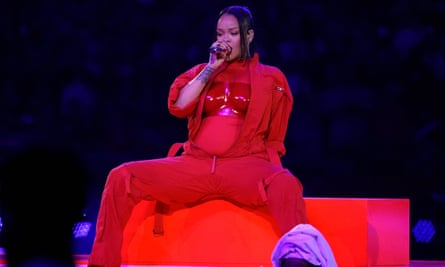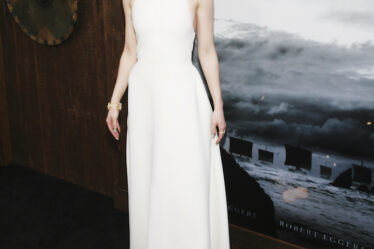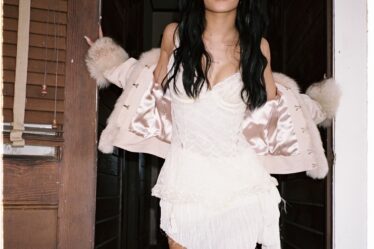
British fashion needs “to step up and say something” at a moment when the country is “in a paralysis,” leading London fashion week designer Jonathan Anderson has said.
His JW Anderson show on Sunday will revive the punk-spirit stage wear of dancer and choreographer Michael Clark – dubbed “the David Bowie of dance” – in a catwalk show celebrating the anti-establishment heritage of British culture.
Rebellion is in the air as London fashion week begins. The entire week of shows are dedicated to the memory of Dame Vivienne Westwood, who died in December. The Design Museum has just announced a major exhibition entitled Rebel – 30 Years of London Fashion to open in September, sponsored by Alexander McQueen.
“I also work in France, where rebellion means a strike,” says Anderson, who has catapulted the bourgeois Spanish leather-goods house of Loewe into a Paris fashion week hot ticket, where clothes are decorated acrylic egg shells or deflated balloons, and the front row has featured Zadie Smith and Timothée Chalamet. “But in Britain, rebellion has also this crazy, creative, vibrant artistic identity – from Clark and McQueen, to Leigh Bowery, Tracey Emin. Westwood was extraordinary – she changed British culture, and it feels like it is only now that we are appreciating the full scale of what she did.”
London fashion week is depleted of major names, with Victoria Beckham having joined the Alexander McQueen and Stella McCartney labels on the Paris schedule. Anderson, who created the pregnancy-announcing boiler suit for Rihanna’s Super Bowl half-time show that made front pages all over the world – a derogatory tweet from Donald Trump was the icing on the cake of global publicity – has serious clout in the industry. Sales at Loewe totalled £402m in 2021, a jump of 38% on the previous year, but the lower profile of London fashion week does not provide the publicity platform necessary for growth on that scale. Keeping his eponymous brand in London has required “soul-searching”, Anderson says.
“There is no denying that Paris and Milan have become dominant. But I would not have been able to build my brand without the talent and the people in this country. I am Northern Irish, I work in Britain, and I’m proud to be here, so I believe that I need to be loud about that and to do what I can to help keep talent here at a difficult moment.”
A unitard inspired by a Tesco bag in which Clark once performed, and a onesie fashioned out of an upside down smiley-face T-shirt, will be part of JW Anderson’s catwalk show on Sunday morning, which will be held at the Roundhouse venue in Camden Town where Clark staged some of his most iconic shows. “Clark was part of the reason I got into fashion,” says Anderson. “He symbolised London as a melting pot of self-expression, that was not just about dance but also about gender, about clubbing, about a rebellion against the establishment. His energy was alien to the prevailing culture of the time, and it represented the possibility of a different kind of future.”
It is this spirit which British fashion needs to rediscover, says Anderson. “British fashion now can’t be tweed skirts, or whatever. Britain is in a very different place now and we can’t hide behind history and heritage. I believe in a creative future for this country, but it is going to require a lot of heavy lifting. And that future is not going to be led by this government, it is going to be led by the people. Fashion and the arts has an important role to play, because you need lateral thinking at a time like this. It is easy to hate fashion because it is associated with commerce – but it has real psychological power. Fashion can be a liberator.”
Shock value has replaced chic as the currency of fashion, with Schiaparelli’s faux-taxidermy lion head cocktail dresses dominating coverage of the most recent haute couture fashion week. Anderson has been one of the drivers of fashion’s shift toward the surreal – a JW Anderson £795 resin clutch bag in the shape of a pigeon went viral last year after it was spotted being cradled by actor Sarah Jessica Parker – but insists that he “tries not to make things that are obnoxiously gross. We have glorified very weird things in fashion in the last few years – and climaxed on the idea of the grotesque. Fashion has become recreational outrage.
After Kanye West shocked Paris fashion week with a “White Lives Matter” sweatshirt last year, the first show by Balenciaga after the brand were forced to apologise for a series of offensive advertising images will be a flashpoint of the season, with some editors and buyers set to decline their invitations. Anderson is critical of ‘cancel culture’, pointing out that Alexander McQueen, who shot to fame with the violent imagery of his Highland Rape collection in 1995, would have been likely to have been cancelled “and that can’t be a good thing.” Now, the power of clickbait means that “some people have fallen on the blade of outrage, because they have courted that outrage. That’s a terrible game to play.”
Anderson is not above a controversial accessory. The high-heeled leather mules with toes in the shape of cat paws which will be worn on his catwalk on Sunday are likely to prove catnip – pun intended – to fashion audiences currently in thrall to animal kingdom imagery, from Schiaparelli’s big cats to Anderson’s pigeons. Many will appreciate the reference to designer Martin Margiela’s iconic split-toe Tabi shoes, which first appeared on catwalks in the late 1980s era when Clark found fame as a dancer and choreographer.


